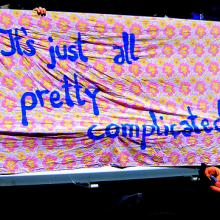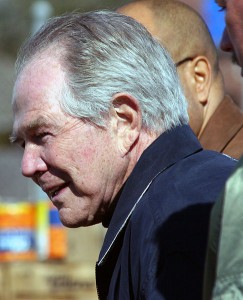Abortion
Nellie Gray, the longtime leader of the annual March for Life, which protests the 1973 Roe v. Wade decision that legalized abortion, has died at age 88.
The March for Life website said on Tuesday that Gray died “over the weekend.”
“Until the very last moment of her life, Nellie pressed for unity in the prolife movement,” the website states. “She firmly believed that not a single preborn life should be sacrificed for any reason.”
The Rev. Frank Pavone, a high-profile anti-abortion activist and national director of Priests for Life, has been a march participant since 1976.
“Every year since 1974, Nellie Gray has mobilized a diverse and energetic army for life,” he said. “Her own commitment to the cause never wavered. She was a tireless warrior for the unborn and her motto was 'no exceptions.’”
The influence of clergy in swaying their congregants' attitudes about moral issues like abortion and contraception access is dwindling, according to a new study.
The Religion, Values, and Experiences: Black and Hispanic American Attitudes on Abortion and Reproductive Issues survey, conducted by the Public Religion Research Institute, shows that there continues to be a disconnect in personal, moral belief and feelings about public policy.
"What they're hearing at church is not the big mover on attitudes of legality of abortion," Robert Jones, PRRI CEO, said.
While 51 percent of black Americans believe abortion is morally wrong, 67 percent say it should be legal in all or most cases.
"I really think that freedom of choice is probably one of the most precious components of what it means to be a Christian. Blacks have been quite possessive and reflective of this fact," said Dr. Stacy Floyd-Thomas, associate professor of Ethics and Society at Vanderbilt University's Divinity School. "… You do have the majority saying that they might see it as a sin or they are against it, but you still have the right."
Both groups believe it is possible to disagree with church teaching and be a good Catholic or good Christian. Jones pointed to the growing trend of personal versus external focus. Previous surveys have shown that attitudes about religion are mostly influenced by people's own beliefs and behaviors rather than institutional doctrine.
A new poll released today shows an overwhelming percentage of black and Hispanic voters favor Barack Obama over Mitt Romney in the upcoming presidential election — 87 percent and 58 percent, respectively. Both groups say the economy is a critical issue in the election.
The Religion, Values, and Experiences: Black and Hispanic American Attitudes on Abortion and Reproductive Issues survey, conducted by the Public Religion Research Institute, also showed that two-thirds of black Americans believe abortion should be legal in all or most cases, while only 46 percent of Hispanic Americans agreed.
Both black and Hispanic Americans (81 and 79 percent, respectively), say contraception is morally acceptable and support expanding access to it. Further 61 percent of black Americans and 64 percent of Hispanic Americans say religiously affiliated institutions should provide contraception at no cost to their employees.
For more on the survey, stay tuned to the God's Politics blog for continued coverage.
NPR reports that Michigan state representative Lisa Brown was not allowed speak on other legislation yesterday after she made a speech against a bill restricting abortion in which she used the word "vagina." A Republican spokesperson said Brown had violated the "decorum of the House."
"Brown called a press conference, today," the Detroit Free Press reports. "She defended her use of the word "vagina," saying it is the "anatomically medically correct term."
"If they are going to legislate my anatomy, I see no reason why I cannot mention it," she said according to the Free Press.
"Regardless of their reasoning, this is a violation of my First Amendment rights and directly impedes my ability to serve the people who elected me into office," Brown added in a statement released by her office.
Read more here
Richard Florida examines how geography impacts abortion in the United States, and what it tells us:
"Few issues divide Americans more severely than abortion. Even accounting for changes in the nation's political climate over time, polling numbers consistently show a close to even split in the percent of the population who identify as pro-life or pro-choice. And given the variation in abortion laws across the 50 states, that divide has a definite geographic dimension as well."
Read the full story here
Leaders representing most of the nation’s 57,000 Catholic nuns on Friday (June 1) answered a Vatican crackdown on their group by charging that Rome’s criticisms of the sisters were “unsubstantiated,” caused “scandal and pain” and “greater polarization” in the church.
“Moreover, the sanctions imposed were disproportionate to the concerns raised and could compromise their ability to fulfill their mission,” the 22-member board of the Leadership Conference of Women Religious warned in a statement issued after a special four-day meeting in Washington.
The LCWR board meeting followed the surprise announcement in April that Pope Benedict XVI wanted a Vatican-led makeover of the group on the grounds that it was not speaking out strongly enough against gay marriage, abortion and women’s ordination.
Rome also chided the LCWR for doctrinal ambiguity and sponsoring conferences that featured “a prevalence of certain radical feminist themes incompatible with the Catholic faith.”
The unexpectedly strong pushback to the Vatican may be an indication of how much backlash the campaign has sparked among Catholics, who value the sisters’ longstanding ministry in education, health care and social services, and who bristle at Rome's demands to focus instead on sexual morality and enforcing orthodoxy.
It’s profoundly disheartening to see people in political leadership and positions of cultural influence whose understanding of women’s anatomy—and that it is possessed by human beings, not mythical prototype “whores,” “virgins,” or “martyr mothers”—hasn’t progressed much past pre-adolescent hooting at drawings on the boys’ room walls.
Don’t get me wrong—I’m not actually looking for excuses to chat about vaginas or hormones with strangers or friends. I’m fairly comfortable with prudish reserve in daily life, especially when the alternative is coarse humor that’s usually not very funny. Then again, if you watch TV sitcoms or contemporary comedy films, hearing the word “vagina” outside of a gynecologist’s office isn’t the surprise it once was. As Ann Hornaday noted in her March 13 essay in The Washington Post, the word is now so prevalent, “it’s hard to believe that, just six years ago, Grey’s Anatomy producer Shonda Rhimes made ABC standards and practices executives so nervous about the word that she substituted the far more playful ‘va-jay-jay.’”
By contrast, when Eve Ensler’s “Vagina Monologues” debuted in 1996 it was controversial theater for a number of reasons, the most obvious being the first word in the title. The play was groundbreaking in its forthright exploration of women’s experiences—the brutal, the ecstatic, the ambivalent—in relation to women’s distinctive anatomy. It helped many women reclaim the language for their own bodies in the public sphere, rather than being limited to euphemisms and crudities deployed by others. The play opened up more space to talk about sexual abuse and violence against women, a step in weakening the shame that is part of any abuser’s arsenal.
For decades, Psalm 139 has been a byword of the anti-abortion movement, printed on posters in crisis pregnancy centers. More recently, it's been tied to high-resolution ultrasounds, the movement's most potent technological persuader.
At the same time, the famous Psalm has also "come out" as a source of strength for gay and lesbian Christians.
Together, the two uses illustrate how great verses -- particularly the Psalms -- attract diverse constituencies.
A new movie confronts a controversial topic by highlighting two words that don't typically go together: "abortion" and "survivor."
"We didn't know there was such a thing," said Jon Erwin, who wrote and co-directed "October Baby" with his brother, Andrew.
The movie tells the story of Hannah, a 19-year-old college student who finds out that she not only is adopted, but she is a survivor of a failed abortion attempt, which explains why she has been suffering from health problems all her life.
A letter from Alec Hill, President of InterVarsity Christian Fellowship/USA to Intervarsity Staff
I’m upset.
Last month, the Federal government mandated that Catholic universities, hospitals and charities must provide – and pay for – contraceptives to their employees and students. The mandate may also — depending upon interpretation – include the provision of sterilization services and the morning-after pill. (There appears to be some disagreement amongst scholars regarding the potential scope of the new Health and Human Service mandate.)
Why should I care? I am not Catholic. Nor do I agree with Catholic teaching on contraception, though I do have grave concerns about the morning-after pill.
Politically, I am a moderate and hence not prone to condemn every governmental edict.
I care because this matter touches upon the religious freedom of us all. I care because InterVarsity is engaged in a parallel struggle. Over the past 18 months, our status as a recognized student organization has been challenged on 41 campuses.
One of the U.S. Constitution's difficult balances is found in the freedom of religion clause of the First Amendment:
“Congress shall make no law respecting an establishment of religion, or prohibiting the free exercise thereof …”
What happens when those two values conflict?
That is the issue with the controversy over whether religiously-affiliated organizations should be required to offer free coverage for contraception in health insurance plans made available to employees. Those opposed — most notably Catholic organizations — claim that this requirement would violate their freedom of conscience. Those who support it claim that exempting religiously-affiliated organizations would establish a religion over the rights of individuals.

"It's Complicated." Photo by Jenny Poole via Wylio http://www.wylio.com/credits/Flickr/4752357353
A fascinating new study by the Public Religion Research Institute found that two-thirds of all Americans identify with both the "pro-life" and "pro-choice" labels simultaneously.
The PRRI reports that 7-in-10 Americans say the term “pro-choice” describes them "somewhat" or "very well," and nearly two-thirds simultaneously say the term “pro-life” describes them "somewhat" or "very well."
"This overlapping identity is present in virtually every demographic group," the report said.
In one of the largest public opinoin surveys ever conducted on the subject of abortion and religion, PRRI's study, "Millennials, Abortion and Religion Survey," uncovered "large generational differences on two issues that have often been linked in political discourse: abortion and same-sex marriage."
According to the survey, Americans ages 18-29 (a.k.a., "Millennials") strongly support legal access to abortion services in their local communities despite being conflicted about the morality of abortion itself.
“Evangelical voters” have now been sized and squeezed into a homogeneous political block. These folks have views on the political right wing, trust in robust American military might, believe that wealth is a blessing to be protected by tax policy, want society to be inhospitable toward gays, oppose any form of abortion, feel that “big” government is always malevolent, and assert that American individualism is the divinely sanctioned cornerstone of the Republic. Apply the label “evangelical” to a voter and you can expect these political responses.
The problem is that it’s simply inaccurate. One size doesn’t fit all when in come to evangelicals. It distorts reality. But that’s just too inconvenient for pundits intent on predicting how various blocks will vote.
New regulations increase accountability and boost quality in Head Start programs. Economic statements from the GOP presidential contenders. "Occupy" groups plan march from New York City to Washington, D.C. Our expensive, expanding nuclear weapons complex. Evangelicals call for nuclear cutbacks. Mississippi rejects abortion amendment. Ohio repeals anti-union law. And is Occupy Wall Street overshadowing itself?
Yesterday (Nov. 8), Mississippi voters defeated Ballot Measure 26, "the Personhood Amendment," which would have granted the status of legal person to a fertilized egg. The measure effectively would have outlawed abortion in all circumstances within the state, deeming it murder. It would have made the protection of the mother's life a criminal offense, if that protection risked the life of the fertilized egg.
There were lots of points of controversy over this measure. It was so extreme that even the Catholic Bishops denounced it. For me the most haunting question was this: "Who would it harm most?" My conclusion: families -- especially poor ones. When mothers -- especially poor ones -- die of complications in childbirth, families fold.
People of faith -- including evangelical Christians -- will be voting both ways in the upcoming election. It is simply not true that they will be voting only on one or two issues.
And, if evangelicals focus on many of the issues central to their faith, rather than becoming partisan cheerleaders, they might be able to raise some critical issues in this election and to hold both sides more accountable, even in a campaign that both Richard and I suspect will be one of the ugliest in U.S. history.
At the end of the evening, Amy remarked that if the upcoming election debates were as civil and substantive as this evening was, we would all be very grateful.
Vatican Meets OWS: 'The Economy Needs Ethics'; Lack Of Jobs Leaves More Suburban, Middle Class Sliding Into Poverty; Rick Perry Challenges Opponents' Abortion Stances At Iowa Faith & Freedom Dinner; Rick Perry Talks Iraq And His 'Love Affair' With Guns; Ask Candidates For Office About Poverty; Bachmann Gives 'Faith Testimony' At An Iowa Church; Evangelical Voters Hold Sway In Iowa
The reason the word Evangelical has become so poisonous is because the answer to the above question comes from a conversion-based model of cultural engagement - political, theological and social. Too many Christians believe, and have wrongly been taught, that those "others" and "opposites" who have made an active choice not to believe in "our" teachings are justifiably: 1) left to their own devices as we wash our hands of them because of their bad choice (think in terms of blood-on-their-own-head); or 2) uninformed, so much so that their "no" is an illegitimate answer.
Evangelicals care more about positions -- whether progressive or conservative -- than people. We lack nuance. We have become either all Scripture or all Justice. I don't know where the balance was lost in terms of holding Scripture in high authority and, simultaneously, loving with reckless abandon?
Today (Oct. 4) Christians around the world celebrate the life of St. Francis of Assisi, one of the bright lights of the church and one of the most venerated religious figures in history.
The life and witness of Francis is as relevant to the world we live in today as it was 900 years ago. He was one of the first critics of capitalism, one of the earliest Christian environmentalists, a sassy reformer of the church, and one of the classic conscientious objectors to war.












